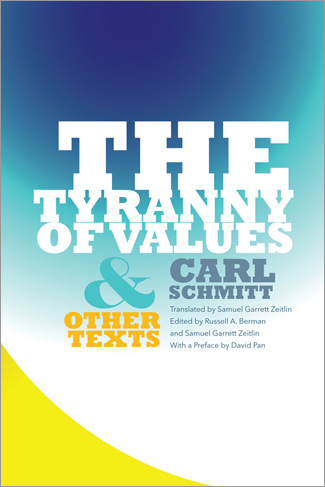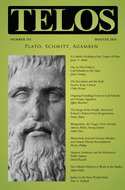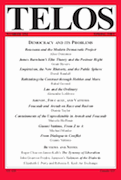By Telos Press · Monday, December 17, 2018 New from Telos Press: The Tyranny of Values and Other Texts, by Carl Schmitt. Translated by Samuel Garrett Zeitlin, edited by Russell A. Berman and Samuel Garrett Zeitlin, and with a preface by David Pan. Order your copy in our online store, and save 20% on the list price by using the coupon code BOOKS20 during the checkout process.
 Written during the Weimar Republic, the Nazi era, and the Cold War, this collection of occasional pieces provides an instructive look at the ways in which Carl Schmitt employed his theories in order to make judgments about contemporary historical events and problems. Covering topics such as the political significance of universalism and jurisprudence, the meaning of the partisan, the world-historical significance of the Cold War, the deterioration of metaphysics into “values,” the relationship between theoretical concepts and concrete historical situations, and his views on thinkers such as Machiavelli, Bodin, and Rousseau, these essays establish a revealing counterpoint to his more formal work. They react on the one hand directly to contemporary political questions and demonstrate the way in which he saw the immediate historical significance of his ideas. On the other hand, he also feels free to provide in these pieces the kinds of methodological reflections that help us to better understand the particular epistemological framework that makes his thought so unique. Written during the Weimar Republic, the Nazi era, and the Cold War, this collection of occasional pieces provides an instructive look at the ways in which Carl Schmitt employed his theories in order to make judgments about contemporary historical events and problems. Covering topics such as the political significance of universalism and jurisprudence, the meaning of the partisan, the world-historical significance of the Cold War, the deterioration of metaphysics into “values,” the relationship between theoretical concepts and concrete historical situations, and his views on thinkers such as Machiavelli, Bodin, and Rousseau, these essays establish a revealing counterpoint to his more formal work. They react on the one hand directly to contemporary political questions and demonstrate the way in which he saw the immediate historical significance of his ideas. On the other hand, he also feels free to provide in these pieces the kinds of methodological reflections that help us to better understand the particular epistemological framework that makes his thought so unique.
Continue reading →
By Flaminia Incecchi · Tuesday, January 31, 2017 In “A Tragic Desire: Rousseau and the Modern Democratic Project,” Alice Ormiston brings to the fore a figure often neglected in contemporary political theory and that, as the title foreshadows, is Jean-Jacques Rousseau. First, Ormiston—animated by the task of the intellectual historian—traces to Rousseau the discovery of a fundamental clash at the heart of the modern subject, which is that between nature and abstract reason. Such tension, Ormiston claims, has influenced, or is present in, subsequent thinkers like Kant, Hegel, Marx, Nietzsche, and Freud. Rousseau identifies the clash between nature and reason, and eyeing man’s primitive condition with nostalgia and viewing his modern condition with contempt, he is seeking to resolve such contention in his works.
Continue reading →
By Brent Ranalli · Thursday, May 12, 2016 Adam Smith is usually remembered as a champion of commerce. But as a moral philosopher he understood that even as commerce inculcates the virtues of industry, frugality, and temperance, it also inculcates vices such as avarice, envy, and short-sighted self-centeredness. Smith recognized that good government requires virtues such as honor, moral rectitude, patriotism, magnanimity, and a far-sighted perspective, to which the commercial vices are fairly opposed. Smith considered this a problem in his own day, as Great Britain was threatening to become a nation of shopkeepers, ruled by classes trained not in statesmanship but in commerce, governed not by codes of honor but by self-interest. The problem has resonance today as well.
Continue reading →
By Peter A. Redpath · Friday, January 27, 2012 Peter A. Redpath’s “Justice in the New World Order: Reduction of Justice to Tolerance in the New Totalitarian World State” appears in Telos 157 (Winter 2011). Read the full version online at the TELOS Online website, or purchase a print copy of the issue here.
 This article’s general thesis is that, shortly after World War II, some leading Western intellectuals started to work to build a new world order based upon a modified understanding of national sovereignty and a notion of justice that rejected Machiavellianism. It claims that during the 1960s, this project became hijacked by Western socialists and was turned toward undermining the authority of national constitutions and legal traditions and promoting Machiavellianism on a global scale. Socialists effected this transformation by wedding Nietzsche’s Machiavellianism to Rousseau’s teaching about morality. From Rousseau they adopted the notion of “tolerance”—having the right feelings and right way of reading history about an exploited, sinless, innocent class (the proletariat under communism)—to replace the classical notion of justice as a moral, behavioral, quality (habitually behaving rightly toward other people) in human affairs. Of crucial significance is that, in the process, they changed the West’s understanding of justice from a classical moral category related to behaving rightly toward others into a hermeneutical category of having the right political reading of history. This article’s general thesis is that, shortly after World War II, some leading Western intellectuals started to work to build a new world order based upon a modified understanding of national sovereignty and a notion of justice that rejected Machiavellianism. It claims that during the 1960s, this project became hijacked by Western socialists and was turned toward undermining the authority of national constitutions and legal traditions and promoting Machiavellianism on a global scale. Socialists effected this transformation by wedding Nietzsche’s Machiavellianism to Rousseau’s teaching about morality. From Rousseau they adopted the notion of “tolerance”—having the right feelings and right way of reading history about an exploited, sinless, innocent class (the proletariat under communism)—to replace the classical notion of justice as a moral, behavioral, quality (habitually behaving rightly toward other people) in human affairs. Of crucial significance is that, in the process, they changed the West’s understanding of justice from a classical moral category related to behaving rightly toward others into a hermeneutical category of having the right political reading of history.
Continue reading →
By Alice Ormiston · Friday, April 29, 2011 Alice Ormiston’s “A Tragic Desire: Rousseau and the Modern Democratic Project” appears in Telos 154 (Spring 2011). Read the full version at TELOS Online website.
 This article begins by showing how the desire for justice in the modern democratic tradition is a manifestation of a deeper drive toward unity between nature and reason, as well as self and community. The bulk of the article explores Rousseau’s works as a demonstration that this drive towards unity is tragic in nature—it cannot be fully realized, and at the same time cannot be given up. Furthermore, Rousseau’s inability to accept this desire as tragic, his insistent attempts at creating a total unity between nature and reason, and self and community, leads to its own secondary set of tragedies in his works and his life. The tragic nature of the modern democratic orientation must be recognized and integrated, in order to avoid these secondary tragedies. This article begins by showing how the desire for justice in the modern democratic tradition is a manifestation of a deeper drive toward unity between nature and reason, as well as self and community. The bulk of the article explores Rousseau’s works as a demonstration that this drive towards unity is tragic in nature—it cannot be fully realized, and at the same time cannot be given up. Furthermore, Rousseau’s inability to accept this desire as tragic, his insistent attempts at creating a total unity between nature and reason, and self and community, leads to its own secondary set of tragedies in his works and his life. The tragic nature of the modern democratic orientation must be recognized and integrated, in order to avoid these secondary tragedies.
Continue reading →
|
|
 Written during the Weimar Republic, the Nazi era, and the Cold War, this collection of occasional pieces provides an instructive look at the ways in which Carl Schmitt employed his theories in order to make judgments about contemporary historical events and problems. Covering topics such as the political significance of universalism and jurisprudence, the meaning of the partisan, the world-historical significance of the Cold War, the deterioration of metaphysics into “values,” the relationship between theoretical concepts and concrete historical situations, and his views on thinkers such as Machiavelli, Bodin, and Rousseau, these essays establish a revealing counterpoint to his more formal work. They react on the one hand directly to contemporary political questions and demonstrate the way in which he saw the immediate historical significance of his ideas. On the other hand, he also feels free to provide in these pieces the kinds of methodological reflections that help us to better understand the particular epistemological framework that makes his thought so unique.
Written during the Weimar Republic, the Nazi era, and the Cold War, this collection of occasional pieces provides an instructive look at the ways in which Carl Schmitt employed his theories in order to make judgments about contemporary historical events and problems. Covering topics such as the political significance of universalism and jurisprudence, the meaning of the partisan, the world-historical significance of the Cold War, the deterioration of metaphysics into “values,” the relationship between theoretical concepts and concrete historical situations, and his views on thinkers such as Machiavelli, Bodin, and Rousseau, these essays establish a revealing counterpoint to his more formal work. They react on the one hand directly to contemporary political questions and demonstrate the way in which he saw the immediate historical significance of his ideas. On the other hand, he also feels free to provide in these pieces the kinds of methodological reflections that help us to better understand the particular epistemological framework that makes his thought so unique.  This article’s general thesis is that, shortly after World War II, some leading Western intellectuals started to work to build a new world order based upon a modified understanding of national sovereignty and a notion of justice that rejected Machiavellianism. It claims that during the 1960s, this project became hijacked by Western socialists and was turned toward undermining the authority of national constitutions and legal traditions and promoting Machiavellianism on a global scale. Socialists effected this transformation by wedding Nietzsche’s Machiavellianism to Rousseau’s teaching about morality. From Rousseau they adopted the notion of “tolerance”—having the right feelings and right way of reading history about an exploited, sinless, innocent class (the proletariat under communism)—to replace the classical notion of justice as a moral, behavioral, quality (habitually behaving rightly toward other people) in human affairs. Of crucial significance is that, in the process, they changed the West’s understanding of justice from a classical moral category related to behaving rightly toward others into a hermeneutical category of having the right political reading of history.
This article’s general thesis is that, shortly after World War II, some leading Western intellectuals started to work to build a new world order based upon a modified understanding of national sovereignty and a notion of justice that rejected Machiavellianism. It claims that during the 1960s, this project became hijacked by Western socialists and was turned toward undermining the authority of national constitutions and legal traditions and promoting Machiavellianism on a global scale. Socialists effected this transformation by wedding Nietzsche’s Machiavellianism to Rousseau’s teaching about morality. From Rousseau they adopted the notion of “tolerance”—having the right feelings and right way of reading history about an exploited, sinless, innocent class (the proletariat under communism)—to replace the classical notion of justice as a moral, behavioral, quality (habitually behaving rightly toward other people) in human affairs. Of crucial significance is that, in the process, they changed the West’s understanding of justice from a classical moral category related to behaving rightly toward others into a hermeneutical category of having the right political reading of history.  This article begins by showing how the desire for justice in the modern democratic tradition is a manifestation of a deeper drive toward unity between nature and reason, as well as self and community. The bulk of the article explores Rousseau’s works as a demonstration that this drive towards unity is tragic in nature—it cannot be fully realized, and at the same time cannot be given up. Furthermore, Rousseau’s inability to accept this desire as tragic, his insistent attempts at creating a total unity between nature and reason, and self and community, leads to its own secondary set of tragedies in his works and his life. The tragic nature of the modern democratic orientation must be recognized and integrated, in order to avoid these secondary tragedies.
This article begins by showing how the desire for justice in the modern democratic tradition is a manifestation of a deeper drive toward unity between nature and reason, as well as self and community. The bulk of the article explores Rousseau’s works as a demonstration that this drive towards unity is tragic in nature—it cannot be fully realized, and at the same time cannot be given up. Furthermore, Rousseau’s inability to accept this desire as tragic, his insistent attempts at creating a total unity between nature and reason, and self and community, leads to its own secondary set of tragedies in his works and his life. The tragic nature of the modern democratic orientation must be recognized and integrated, in order to avoid these secondary tragedies. 






